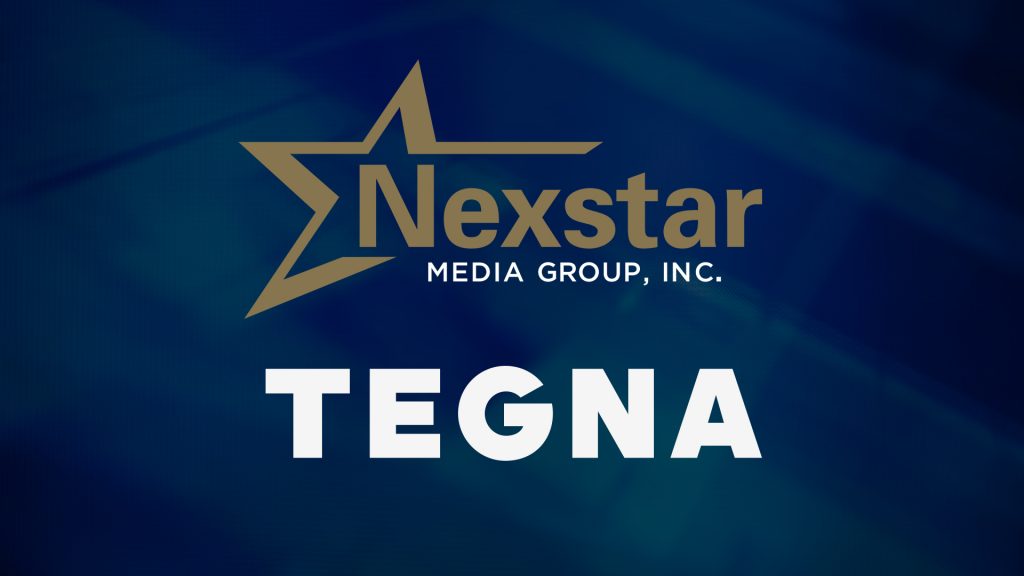Nexstar to buy Tegna for $6.2B as local TV industry consolidates

Nexstar Media Group is set to acquire Tegna for $6.2 billion in a deal that will reshape the local television landscape, creating a powerhouse in U.S. broadcasting. The agreement comes as another industry giant, Sinclair Broadcast Group, was also pursuing a takeover of Tegna.
This is the latest example of media companies consolidating amid shifting regulatory rules and new competition from tech platforms.
Nexstar is largest operator of local TV
Under the agreement announced Tuesday, Nexstar will pay $22 per share in cash for Tegna’s outstanding stock. The transaction would unite two of the country’s biggest players in local television. It is still subject to approval from shareholders and federal regulators.
Nexstar already controls more than 200 owned or partner stations in 116 U.S. markets, along with The CW and NewsNation. Meanwhile, Tegna operates 64 stations across 51 markets.
“This deal represents the best option for Nexstar to act on the opportunities created by the Trump administration’s initiatives to level the playing field,” Nexstar Chairman and CEO Perry Sook said in a statement. He argued that broadcasters must expand to compete with “Big Tech and legacy Big Media companies that have unchecked reach and vast financial resources.”
Sinclair’s last minute push
Before Nexstar finalized its deal, Sinclair Broadcast Group — which owns 178 stations in 78 markets — proposed its own merger with Tegna, according to the Wall Street Journal. Sinclair’s plan would have involved separating its Ventures division, which includes the Tennis Channel and other investments, and then folding the core broadcast business into Tegna.
The reported value of the offer was between $25 and $30 per share, higher than Nexstar’s $22 per share deal. But Sinclair, carrying more than $4 billion in debt and with a market value around $1 billion, faced long odds competing with Nexstar’s $6.3 billion market cap.
Tegna has attracted suitors before. In 2022, it agreed to be acquired by hedge fund Standard General in an $8.6 billion deal. However, that effort collapsed under regulatory scrutiny during the Biden administration. Democratic senators opposed the merger at the time, citing concerns that it would limit competition in the media marketplace.
“The FCC has significant and underutilized authorities to protect competition in the media industry by preventing deals that harm the public interest or reduce competition,” Sen. Elizabeth Warren wrote in a letter opposing the merger. “I urge you to fulfill your statutory duty by blocking this acquisition.”
Deregulation paves way
Nexstar’s expansion bid comes amid sweeping deregulation at the Federal Communications Commission. Last month, the Eighth Circuit Court of Appeals struck down the FCC’s long-standing “top four” rule. The rule prohibited ownership of more than one of the top four stations in a single market.
The FCC, under Chairman Brendan Carr, also announced it would repeal nearly 100 broadcast rules it deemed outdated or irrelevant. Moves to deregulate the local TV industry have received praise from both Nexstar and Tegna.
“We believe that deregulation is necessary, important and coming,” Tegna CEO Michael Steib said on an August earnings call. He argued that broadcasters are competing against digital platforms “with absolutely no encumbrances.”
These changes are expected to open the door for more consolidation across the broadcast industry, which has struggled with “cord-cutting” as more households shift away from cable and satellite toward streaming.
What’s next?
If approved, Nexstar’s takeover of Tegna is expected to close in the second half of 2026. The deal would further cement Nexstar’s status as the largest local broadcaster in the country, following its acquisition of Tribune Media in 2019. Sinclair, meanwhile, has said its board is still exploring “strategic alternatives,” including possible sales, acquisitions or a spinoff of its Ventures unit.





